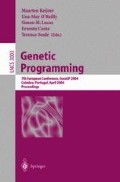Abstract
We propose and describe a minimal cooperative problem that captures essential features of cooperative behavior and permits detailed study of the mechanisms involved. We characterize this problem as one of language generation by cooperating grammars, and present initial results for language induction by pairs of right-linear grammars using grammatically based genetic programming. Populations of cooperating grammar systems were found to induce grammars for regular languages more rapidly than non-cooperating controls. Cooperation also resulted in greater absolute accuracy in the steady state, even though the control performance exceeded that of prior results for the induction of regular languages by a genetic algorithm.
Access this chapter
Tax calculation will be finalised at checkout
Purchases are for personal use only
Preview
Unable to display preview. Download preview PDF.
References
Axelrod, R., Hamilton, W.D.: The evolution of cooperation. Science 211, 1390–1396 (1981)
Axelrod, R., Dion, D.: The further evolution of cooperation. Science 242, 1385–1390 (1988)
Haynes, T., Sen, S., Schoenefeld, D., Wainwright, R.: Evolving multiagent coordination strategies with genetic programming. Technical Report UTULSA-MCS-95- 04, The University of Tulsa (1995)
Luke, S., Spector, L.: Evolving teamwork and coordination with genetic programming. In: Koza, J.R., Goldberg, D.E., Fogel, D.B., Riolo, R.L. (eds.) Genetic Programming 1996: Proceedings of the First Annual Conference, Stanford University, CA, USA, pp. 150–156. MIT Press, Cambridge (1996)
Iba, H.: Emergent cooperation for multiple agents using genetic programming. In: Ebeling, W., Rechenberg, I., Voigt, H.-M., Schwefel, H.-P. (eds.) PPSN 1996. LNCS, vol. 1141, pp. 32–41. Springer, Heidelberg (1996)
Iba, H.: Evolutionary learning of communicating agents. Information Sciences 108, 181–205 (1998)
Wooldridge, M., Jennings, N.R.: The cooperative problem solving process. Journal of Logic and Computation 9, 563–592 (1999)
Csuhaj-Varjú, E., Dassow, J., Kelemen, J., Pǎun, G.: Grammar Systems: A Grammatical Approach to Distribution and Cooperation. Gordon and Breach Science Publishers, London (1994)
Dupont, P.: Regular grammatical inference from positive and negative examples by genetic search: the gig method. In: Carrasco, R.C., Oncina, J. (eds.) ICGI 1994. LNCS, vol. 862, pp. 236–245. Springer, Heidelberg (1994)
De Pauw, G.: Evolutionary computing as a tool for grammar development. In: Cantú-Paz, E., Foster, J.A., Deb, K., Davis, L., Roy, R., O’Reilly, U.-M., Beyer, H.-G., Kendall, G., Wilson, S.W., Harman, M., Wegener, J., Dasgupta, D., Potter, M.A., Schultz, A., Dowsland, K.A., Jonoska, N., Miller, J., Standish, R.K. (eds.) GECCO 2003. LNCS, vol. 2723, pp. 549–560. Springer, Heidelberg (2003)
Fujiki, C., Dickinson, J.: Using the genetic algorithm to generate lisp source code to solve the prisoner’s dilemma. In: Grefenstette, J.J. (ed.) Genetic Algorithms and their Applications: Proceedings of the second international conference on Genetic Algorithms, pp. 236–240. MIT/Lawrence Erlbaum Associates, Cambridge/Mahwah (1987)
Johnson, C.M., Feyock, S.: A genetics-based approach to the automated acquisition of expert system rule bases. In: Proceedings of the IEEE/ACM International Conference on Developing and Managing Expert System Programs, pp. 78–82. IEEE Computer Society Press, Los Alamitos (1991)
Whigham, P.A.: Grammatically-based genetic programming. In: Rosca, J.P. (ed.) Proceedings of the Workshop on Genetic Programming: From Theory to Real- World Applications, Tahoe City, California, USA, pp. 33–41 (1995)
O’Neill, M., Ryan, C.: Grammatical Evolution: Evolutionary Automatic Programming in an Arbitrary Language. Kluwer, Dordrecht (2003)
Keijzer, M., Merelo-Guervós, J.J., Romero, G., Schoenauer, M.: Evolving objects: A general purpose evolutionary computation library. In: Collet, P., Fonlupt, C., Hao, J.-K., Lutton, E., Schoenauer, M. (eds.) EA 2001. LNCS, vol. 2310, pp. 231–244. Springer, Heidelberg (2002)
Johnson, C.M.: A Grammar-Based Technique for Genetic Search and Optimization. PhD thesis, College of William and Mary, Virginia (1996)
van Lohuizen, M.P.: Survey of parallel context-free parsing techniques. Technical Report IMPACT-NLI-1997-1, Delft University of Technology (1997)
Nijholt, A.: Parallel approaches to context-free language parsing. In: Adriaens, G., Hahn, U. (eds.) Parallel Natural Language Processing, pp. 135–167. Ablex Publishing Corporation, Norwood (1994)
Kelemen, J., Kelemenová, A.: A grammar-theoretic treatment of multiagent systems. Cybernetics and Systems 23, 621–633 (1992)
Yonezawa, A., Ohsawa, I.: Object-oriented parallel parsing for context-free grammars. In: Adriaens, G., Hahn, U. (eds.) Parallel Natural Language Processing, pp. 188–210. Ablex, Norwood (1994)
Khanna, S., Ghafoor, A., Goel, A.: A parallel compilation technique based on grammar partitioning. In: Proceedings of the 1990 ACM annual conference on Cooperation, pp. 385–391. ACM Press, New York (1990)
Author information
Authors and Affiliations
Editor information
Editors and Affiliations
Rights and permissions
Copyright information
© 2004 Springer-Verlag Berlin Heidelberg
About this paper
Cite this paper
Johnson, C.M., Farrell, J. (2004). Evolutionary Induction of Grammar Systems for Multi-agent Cooperation. In: Keijzer, M., O’Reilly, UM., Lucas, S., Costa, E., Soule, T. (eds) Genetic Programming. EuroGP 2004. Lecture Notes in Computer Science, vol 3003. Springer, Berlin, Heidelberg. https://doi.org/10.1007/978-3-540-24650-3_10
Download citation
DOI: https://doi.org/10.1007/978-3-540-24650-3_10
Publisher Name: Springer, Berlin, Heidelberg
Print ISBN: 978-3-540-21346-8
Online ISBN: 978-3-540-24650-3
eBook Packages: Springer Book Archive

